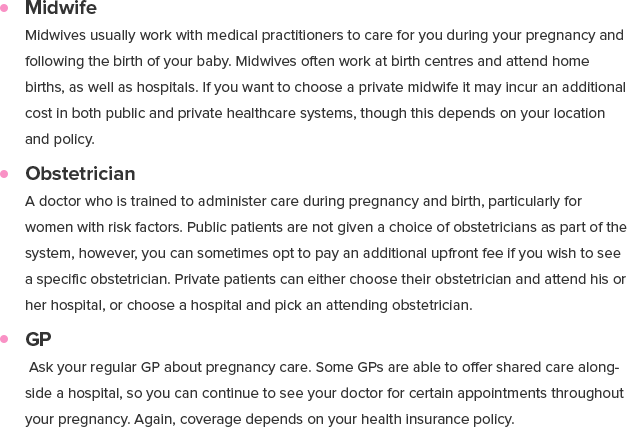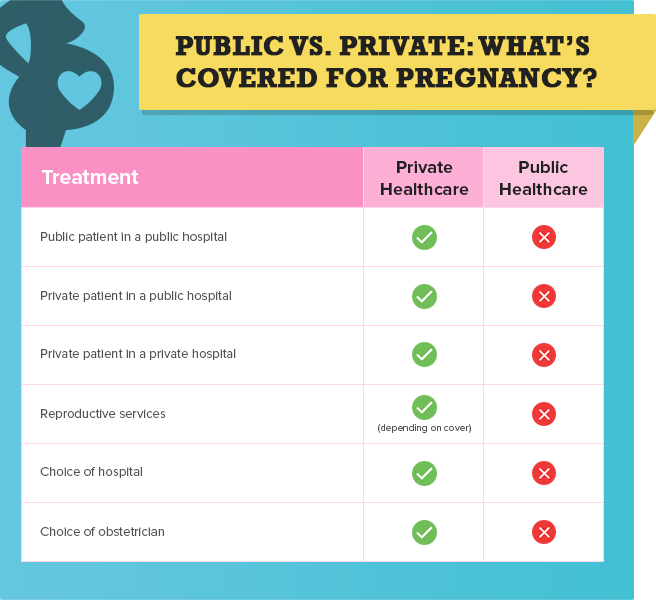Still have questions? Let's talk!
Confused? Not sure if this applies to your situation? Phone us on 1300 163 402 for some free, no obligation advice.

Starting a family in Australia raises one very important question: will you go through the public healthcare system or opt for private health insurance? Both systems have their pros and cons, and it can become a very difficult decision, especially if you’re having your first baby.
There is no right or wrong choice overall, only what’s best for you and your family. Still, it can be hard to make up your mind. We’ve put together a comprehensive guide on having a baby in Australia to help you make your decision.
Contents
One of the clearest benefits of using the public healthcare system when having a baby is cost. If you give birth in a public hospital, you usually won’t have to pay any out-of-pocket costs. Scans and antenatal classes may also be covered by Medicare.
Women who choose this option may make some sacrifices in terms of comfort and choice, as you are unable to pick your obstetrician and may not experience continuity of care. Patients in the public system typically give birth in shared rooms. Although you may have less control over your healthcare, choosing to go public is a positive experience for many women.


There are many reasons women get private health insurance when having a baby, and many of them centre around the level of care provided. As a private patient, you expand your healthcare options for yourself and your baby. Women gain more freedom of choice over who their treatment provider will be and where they will give birth.
Private patients often have their own room where partners may also be able to spend the night. It can be very comforting to many women to have a private space when giving birth, not to mention having your loved ones nearby.


There are several ways to customise your birth experience, and one of them is by choosing your preferred caregiver. Some caregivers are covered by Medicare, while others require private health insurance. Here are three options.


Not all women give birth in a hospital. You might be surprised at the range of options available to pregnant women, many of which are covered by both public and private healthcare.




Medicare will cover some or all of your expenses throughout your pregnancy, birth, and postnatal care up to six weeks after birth. Services that are not fully covered are usually subsidised. However, the trade-off for many women is a lack of autonomy in choosing your healthcare providers and birthing location.
Medicare covers the following pregnancy and birth services:
Medicare does not cover:
First, it’s important to be aware that not all private cover includes pregnancy and obstetrics cover. In fact, not all pregnancy policies cover the same services. This gives you flexibility to select a policy that suits your needs and budget, whatever they might be. Be aware of your policy’s level of cover to avoid any unpleasant surprises along the way.
Private health insurance may cover the following:
Private health insurance may not cover:

Preparation is an important part of planning for a pregnancy, and there are some extra considerations to take into account when deciding between public and private healthcare.

Unfortunately, there is no magic formula for determining whether you should go through the private or public system for your pregnancy. Each pregnancy is different, and so are each family’s needs. Take some time to weigh up the benefits of each system and decide which one makes you feel the most comfortable.
Whether you choose to go public or private, knowing what you and your baby are covered for is important. It helps you know what you can expect, both in terms of care, comfort, and financial expense, which can mean a better experience overall.

Confused? Not sure if this applies to your situation? Phone us on 1300 163 402 for some free, no obligation advice.
Our experts can provide you with free personal advice. Let us call you.